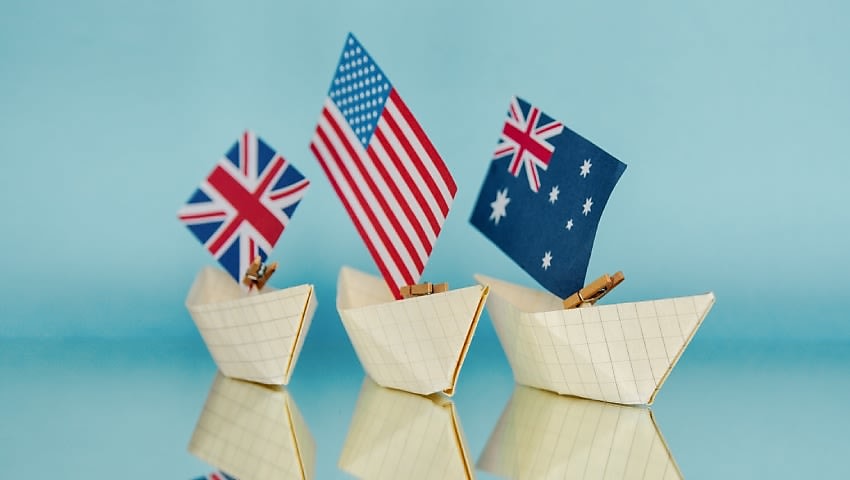There’s been mixed reactions across the nation as Australia prepares to buy three Virginia Class nuclear submarines and build a fleet of its own nuclear submarines under the AUKUS defence agreement.
To continue reading the rest of this article, please log in.
Create free account to get unlimited news articles and more!
Prime Minister Anthony Albanese, US President Joe Biden, and UK Prime Minister Rishi Sunak made the announcement in San Diego, California on 14 March.
Under the deal, Australia will have access to buy an additional pair of nuclear submarines as an option. All submarines will have nuclear propulsion but be conventionally armed under a new SSN AUKUS classification.
The entire deal is worth $368 billion and expected to be completed in early 2030s pending US Congress approval, new vessels will enter service with Australia in the early 2040s.
Australian Academy of Science president Professor Chennupati Jagadish said building capability in nuclear science will be central to developing a nuclear-powered submarine capability.
“Even before AUKUS, there was an increased demand for knowledge in nuclear science in Australia. The AUKUS partnership to acquire nuclear-powered defence submarines, the increasing use of radiotherapies in medicine, focuses on quantum technologies, development of materials robust enough to withstand space radiation — all these sectors require a deep understanding of nuclear physics and subatomic interactions to ensure they are safe and effective,” he said.
“Nuclear science in Australia faces a skills crisis. We are significantly behind our peer nations in national nuclear and radiation science capability.
“Demand for nuclear scientists to meet existing workforce needs, let alone the national capacity to benefit from new developments in nuclear physics, is running well above supply and the capacity of Australian universities to train sufficient scientists.
“Australia is overly dependent on overseas trained workforce and lacks the capacity to train new nuclear scientists to meet our existing needs.”
International defence company Babcock International Group has welcomed the announcement for nuclear-powered submarines under the AUKUS pact.
Babcock chief executive officer David Lockwood said the warship sustainment company in Australia and New Zealand stands ready to help grow Australia’s local industrial capability in relation to AUKUS.
“Babcock plays a critical role in all three countries’ submarine programs today. Our experience of nuclear infrastructure, workforce upskilling, and regulatory and safety stewardship means we are ideally positioned to help deliver a nuclear-powered submarine capability for the Royal Australian Navy under the AUKUS agreement,” he said.
Babcock owns and operates the UK’s only licensed facility for refitting, refuelling, and defuelling nuclear submarines including the delivery of through-life support and life extension of the Vanguard, Trafalgar, and Astute Submarine Class vessels.
The AUKUS program will contribute to skills development in Australia on a massive scale, according to Australian Industry Group national employer association chief executive Innes Willox.
“The program will contribute to skills development in Australia on a massive scale. Tens of thousands of jobs will eventually be created requiring upskilling as well as skill sharing among our AUKUS partners,” he said.
“Delivering maximum benefit for Australia from this historic agreement will require the highest level of cooperation between governments, defence, and industry.
“The AUKUS partnership is much more than submarines. Australia is making a massive technological commitment as part of the agreement. There will be extensive spill-over benefits in technological advancement and technology sharing including around artificial intelligence and quantum technology with its promise of major developments in weapons, communications, sensing, and computing technology.”
Ai Group has indicated Australia should prioritise enhancing trade and technology transfers, eliminating bureaucratic or regulatory barriers impeding the timely delivery of capabilities, building shared, robust, and resilient trade and contracting systems and sharing workforce talent by strengthening international collaboration.
“Now the deal has been inked, the next major priority for the AUKUS governments will be to work to reduce the trade, regulatory, and bureaucratic barriers that could hinder the historic partnership, to create a cohesive industrial base and build the required workforce. These are among the important issues that must be addressed to underpin AUKUS success,” Willox said.
“It is vital that strong benefits are captured for domestic industry from the AUKUS collaboration and we will be looking closely at the details around the local build and domestic supply chain aspects of the overall program to ensure that these benefits are realised.
“The confirmation that South Australia will build up to eight of the AUKUS submarines is most welcome. As well, the capacity and capability of Australian supply chains will benefit from the agreement including through the Collins Life of Type Extension project.
“It is important to note that a significant percentage of the program spend will come from sustainment and the majority of this will be delivered locally.”
Global defence provider Huntington Ingalls Industries (HII) has welcomed the AUKUS defence agreement announcement.
“HII has a proven track record of safely and efficiently building the best submarines in the world for our US Navy customer and delivering advanced all-domain military capabilities for America and its allies and partners,” a HII spokesperson said.
“As more details become available, HII is prepared to leverage our longstanding expertise in nuclear shipbuilding and defence technologies, and our presence in Canberra, Australia, in support of AUKUS.
“We look forward to working closely with the US, Australian, and British governments to execute on our existing commitments and fulfill our mission in service of those who protect peace and freedom around the world.”

 Login
Login







